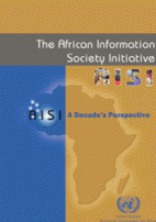The African Information Society Initiative (AISI) - A decade’s perspective

The African Information Society Initiative (AISI), launched in 1996 is perhaps one of the most comprehensive regional ICT-for-development frameworks of its kind. Preceding the Geneva Action Plan of the World Summit on the Information Society (WSIS) of 2003 and the WSIS Tunis Commitments, 2005, AISI can be credited for being a reference point for an African digital vision and agenda in a globalized world. The AISI originated from a 1996 resolution (812 –XXXI) adopted by the ECA Conference of Ministers requesting the Commission to “constitute a high level work group to develop an action plan on ICTs to accelerate socio-economic development in Africa”. The Ministers were convinced that building Africa’s Information Society would help the continent to “accelerate its development plans, stimulate growth and provide new opportunities in education, trade, health care, job creation and food security, helping African countries to leapfrog stages of development and raise their standards of living”.
By and large, the first 10 years of AISI has been devoted to laying the necessary foundations and building blocks in building the Information Society in African countries. As evidence, three quarters of ECA’s 53 member States now have national e-strategies complimenting their development efforts as well as harnessing their ICT sectors to play a greater role in their economies, through the National Information and Communication Infrastructure (NICI) Plans and Strategies. Indeed to quote the former President of Mozambique, His Excellency Joachim Chissano1: “Ever since the African Information Society Initiative was launched in the mid-90s, a host of achievements have been recorded on the continent: thanks to the Project, intra-African traffic and network integration has improved; teledensity has risen significantly in recent times, telecentres and community multimedia centres are taking root and providing access to under-serviced areas”. Although the AISI vision called for the “formulation and development of NICI plans in every African country”, the strategic objectives of the framework also called on African member States to improve communication services and create a continent-wide information and telecommunication network that will allow for fast and reliable communications to and from the continent.